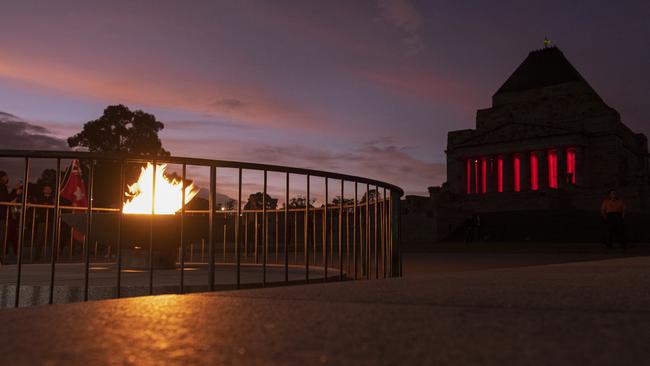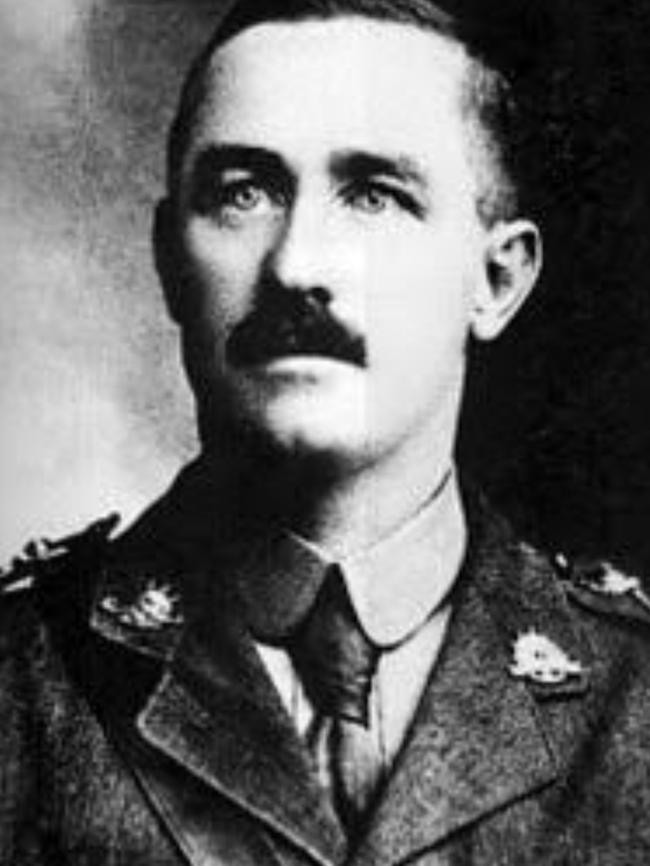Patrick Carlyon: No need to debate the meaning of Anzac Day
Anzac Day is a touchstone in mateship and humour, not bloodlust and conquest. Anyone who attends a dawn service knows war is bad — and we don’t need to debate that.
Patrick Carlyon
Don't miss out on the headlines from Patrick Carlyon. Followed categories will be added to My News.
Some academics have been trying to tear down Anzac Day for years.
They have questioned the reverence applied to the day and labelled the commemoration of war as a celebration.
There is a good reason why no one has taken much notice. A false premise borne of intellectual snobbery, Anzac Day is not a debate that most Australians have thought to have.
Proposed changes to school curriculum have spurred headlines this week.
Education Minister Alan Tudge has disputed the use of the word “contested” in the teaching of “debates about the nature and significance of the Anzac legend and the war”.
An academic, in response, described the choice of “sacred” regard for Anzac Day as “monolithic” and “simplistic”.
That the myth of bronzed warriors was debunked long ago doesn’t seem to matter. It appears we are too dim to grasp that legends are, by definition, built on exaggerations. Nor does the absence of triumphalism, or indeed militaristic overtones, in annual commemorations figure in such supercilious thinking.
For no one is ordered to go to a dawn service. No one walks away from its hush with notions of might or prestige.

War commemorations in Australia are steeped in loss. We honour the individual above the battle. To that soldier, we apply the themes of war. Such as horror. And terror.
These are found in the accounts of those soldiers considered our bravest, the winners of the Victoria Cross. Pick from a selection of VC recipients from World War I, from Fred Tubb to William Dunstan.
These men did not thrive in the chaos. Dunstan, who survived, never talked about Lone Pine and the dull little bronze cross he kept in a cupboard beneath the stairs.
Being broken is a starting point for Australian war commemoration.
War was about the men who returned, moody and preoccupied. And those at home who had dreaded a telegram at the door and would endure lifelong anguish for loved ones, lost of mind if not body.

No politician – and, yes, a few have tried – has successfully decreed that Anzac Day must be sacred. That its folklore must be abided as truth.
Anzac Day is bigger than that. It thrives in the imagination. No Australian bows because they have been told to. No one beats a drum or thumps their chest.
If Anzac Day goes to national identity – a notion that seems to enrage the knockers – it is a touchstone in mateship and humour, not bloodlust and conquest.
If it is a church, it is built on collective melancholy. Its pull lies in first-hand accounts, such as the Anzac who, looking down, “saw squelching up from the ground on either side of my boot like a rotten mango the deliquescent green and black flesh of a Turk’s head”.
Or the Anzac who wrote: “I didn’t cry, unless Gallipoli was one long cry. If you cried once you’d never stop.”
Of course, accepted truths – and their distortions – should be examined.
Kids should, for example, debate the motivations of the Gallipoli landing, and this nation’s blind subservience to a British folly.
Gallipoli was underpinned by a racial assumption that the Turks, mostly uneducated and under resourced, would flee at the first glimpse of Allied intent.
Anzacs were misled and misused, sometimes by more senior Anzacs. They were mostly lice-ridden, had the runs, and demoralised by the inexorable certainty of one battle leading to another.
In Europe, as historian Geoffrey Blainey once wrote, we lost the bloom of a generation. The reverence for them lies in their suffering.
Why do we need to be told how Australians at war should make us feel? And why, if we do, does our implied ignorance require a mental scaffolding of revisionism?

In more recent times, Australians have researched ancestors. They have learnt the lessons of war, as depicted in any decent book or documentary.
They place the privations of the little person, such as their great uncle Joe, above the cliches. There is little glory in war, and I’m yet to meet a reasonably minded Australian who thinks there is.
Anzacs, in the detail, are mostly just ordinary people in extraordinary circumstances. Some Anzacs shied from the contest; some came to be idolised for their grit and generosity of spirit.
Pride in their acts is not a dirty notion and shouldn’t be casually belittled as jingoism.
Anyone who attends a dawn service, or explores the loss of family at Bullecourt or Kokoda, is drawn to an unavoidable conclusion. War is bad.
Where is the debate in that?
Patrick Carlyon is a Herald Sun columnist



